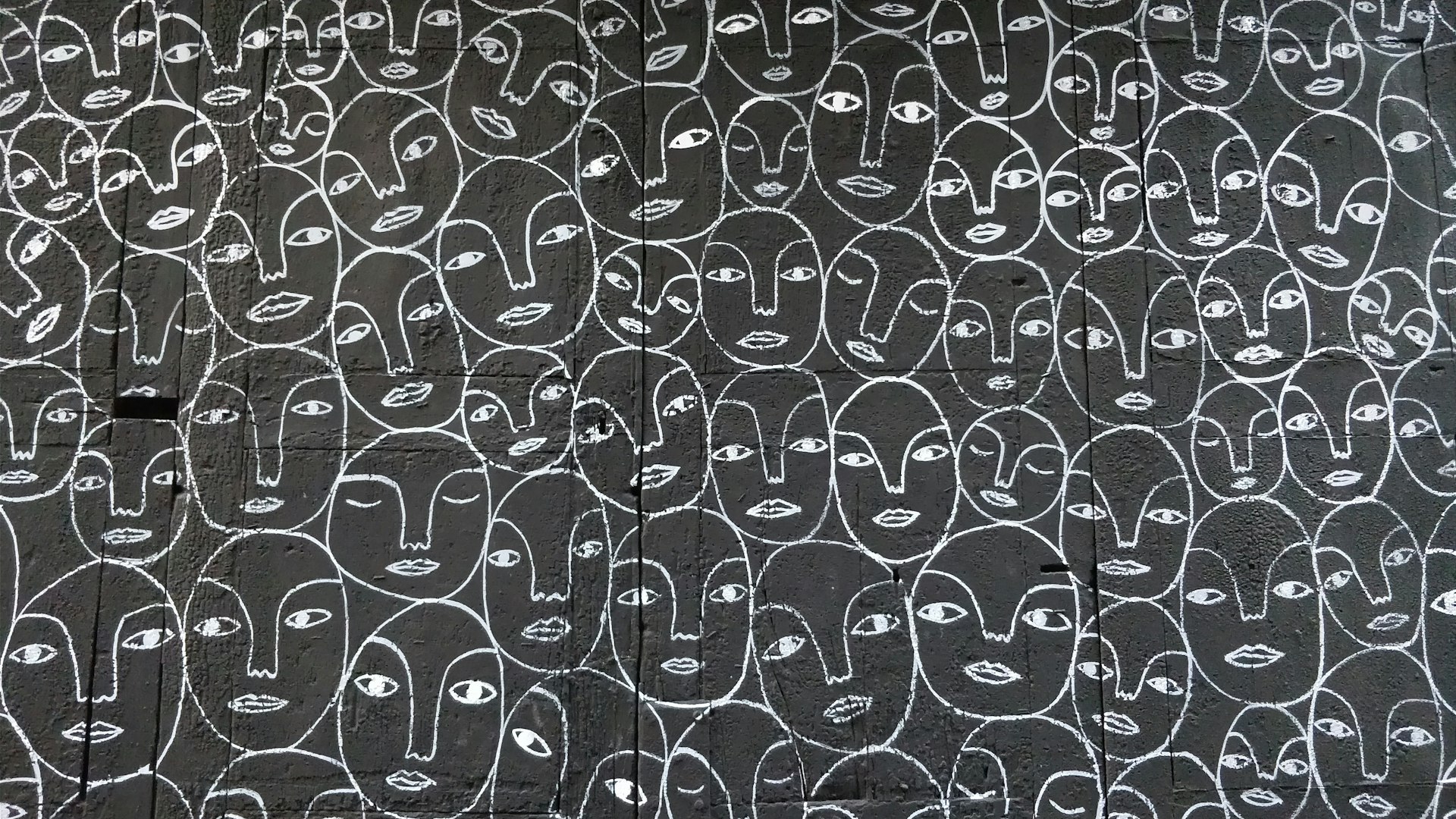By Jingshu Zhu
I’ve been struggling a lot in the last couple of Circles.
And I know, when it's not so comfortable, most of the time, it’s my blind spots being seen again.
It was a Birthday Circle for a 63-year-old friend. This is the fourth time he has talked about his fear of cameras. Every time he talked, he started to curl up, eyes evading the lens.
In the previous Circles, after experiencing all the emotions, his body started to unfold, and he regained the feelings of safety and confidence, to the extent that he could even improvise in front of the camera. That's exactly his dream - to make a speech about his truth, live broadcasting to millions of people.
But this time, he seemed to have completely forgotten the confidence he had cultivated. He hid again with his arms and burst into tears. As usual, he began to talk about how afraid he was to make mistakes in front of the camera, afraid that one single mistake that’s videotaped can ruin his whole career.
The first reaction in my mind was some quite strong judgments:
"Oh, don’t come again!"
"How many more times will this story be repeated? I'm sick and tired of it!"
"Were our efforts in the previous Circles in vain?"
Behind these harsh judgments is my deep fear.
He's now 63 years old, and his fear has entangled him for decades. He's quite a charismatic man, with lots of wisdom in spirituality and emotional intelligence, yet was refrained from shining to the fullest.
I was so afraid that when I’m 63 years old, like him, I will still be haunted by my own limiting thoughts and behaviors … Gosh, I’m scared.
The next Birthday-Circlee was a woman in her thirties. This was the gazillionth time that she doubted herself and saw her not having a Master’s degree as a drawback.
However, in our eyes, she is already outstanding - smart, sharp, and candid. We want to be friends with her, which has nothing to do with her degree.
It's really painful to see her self-attack dim her brilliance. When she was overwhelmed by her doubt and nervousness, she's more likely to underperform. That again confirmed her belief of "not good enough". A vicious loop.
Once again, my impatience and boredom went online.
"Again?!"
"I've heard enough. Can’t you change a theme?"
However, as a Circling facilitator, how can I say such mean words? I judged my judgment.
So I gathered up my curiosity and asked her how she felt at the moment.
Alas, curiosity is like an orgasm - faking it hardly works. Deeper intimacy only comes from a genuine wish to get into the other's world.
Similarly, two weeks ago, one of my trainees in the Circling training camp repeated her pattern of "not being loved".
Again, my frustration climaxed, along with my judgments and fear.
Oh my god, I suddenly realized that "disliking patterns " is exactly my pattern!
This is definitely a blind spot of mine. It repeatedly appears in every corner of my life, and precisely because it’s so deep inside of me, I wasn't aware of it at all.
I realized that I have a very insidious judgment: “patterns are bad”. This judgment made me believe that growth means to break away from my patterns, otherwise, it’s stagnation or even regression.
It sounds plausible, but now I see, that behind this strong desire to break the pattern, there is a lot of shame.
Shame is the sharpest knife stabbing inward. The shameful voice says to me, "People who keep repeating a pattern are either stupid or weak." "People who dare not to change the patterns are probably lacking willpower and addicted to their past."
Well, an easy way to get rid of shame is to put it on someone else, isn’t it?
As a result, I saw other people’s patterns so clearly. Then also came a delusion: "I have dealt with all my issues, and unlike them, I’ll not fall back."
Now, the bubble poked, I get to have a closer look at my own pattern of I "disliking patterns". It looks like this -
When some actions and ideas of myself or others start to repeat, I become impatient and bored, and my empathy and curiosity gradually decline. I start to seek more unique and fresh experiences.
It also leads me to be afraid of making mistakes. If I make a mistake for once, I can give myself a lot of tolerance and encouragement; but if I make the same mistake again, my patience is gone.
Only now do I realize that the permission to make mistake only once is more of a prohibition than permission. I used to give empathy for my pain only once, and secretly expect it to be forever gone. This is conditional love.
Of course, I was not born with such stinginess in empathy.
In another Circle, the memories of my father came to my mind. Before my mind told any story, my eyes were already wet.
My father has been very strict with me. I still remember that when I was 8 or so, I wrote one word incorrectly in my homework, and he tore up the whole page. (Yes, I told this story elsewhere before, and now I’m "repeating" it.)
Having left my hometown for more than a decade, I don’t hear much of his criticism anymore. But the real challenge only started, because now I need to deal with his voice, internalized. His harshness became part of me, and part of my shame as well.
Even after years of therapy and meditation, his voice is still there, which has become my inner critic, loud and mean.
"Why haven't you grown up after so many times?" I talk to myself like my dad did.
I know, a pattern is not necessarily a mistake. It's a form of self-protection that may no longer serve us. But with this unrelenting voice, I equated patterns with mistakes and rushed to correct them.
My mother’s habitual reaction exacerbated my discomfort with patterns — she always likes to end the difficult conversion by saying, “After today’s talk, let’s move on to the next chapter.”
I understand that she had suffered a lot in her childhood during the Cultural Revolution and experienced all sorts of traumas, and "moving on" as soon as possible was her only strategy. For her, indulging in hard feelings would make it more difficult to survive in famine and bullying.
I still remember when I came out as bisexual with her, she didn’t even want to know, and she said, "I’ll just pretend you never told me. Let’s move on. "
Likewise, I have also unconsciously internalized my mom's rapid moving away from feelings and moving on. Instead of letting myself cry for as long as I want, I would tell myself, "don’t be so sensible"; and before expressing my anger fully, "don't be so childish".
Wow, there were at least three people squeezing into my body, shouting to be heard.

Now they are finally heard, by myself and by my Circling community. I feel huge relief in my body. I start to look at old patterns from new perspectives.
1. Repetition is never copy-paste.
Each time a pattern appears, it seems to be the same voice telling the same old story, but actually, its volume, content, duration, and emotional intensity are all different.
Actually, hastily labeling it as "the old story coming again" has a tint of arrogance in it. It's our brain slacking, ignoring the nuances in the ways a pattern unfolds in different contexts.
Besides, what if repetition is meant to bring us new insights?
2. A painful pattern is just like any physical injury - it takes time to heal.
Our mind can grasp an insight in seconds, "yeah, I know, I know, inner critics are no longer helpful", but to embody that wisdom and rewire ourselves, may take decades.
I really like Matt Kahn's insight that it’s the body’s journey, not the mind’s. Our thinking mind (whether it’s our ego or even our higher self) is only the body’s spiritual teacher, who can at most give some advice and support. In the end, it’s still the body that’s walking the path, falling and growing.
The faster you want to go, the slower the healing will happen.
3. The slowness of the body and the uncontrolled repetition of patterns keep teaching us one thing: Surrender.
Raised in China, the tendency to become a "good student" has been ingrained in me. Even on the spiritual journey, this part of me can still be quite competitive, striving to learn all the teaching, get a high score, gain some compliments, and then climb to the next level.
I should already overcome my patterns after learning for so long, shouldn’t I!?
Too bad, (or should I say, luckily?), the spiritual path doesn't work that way. There’s no entry exam towards enlightenment, let alone certificates. I have to let go of my wish to “stop my patterns as a good student should”, and surrender.
To surrender simply means to believe that when a pattern reappears, it should reappear, regardless of our preferences. If you have a hard time accepting that, remember the previous point: it’s the body’s journey.
4. Let's celebrate every repetition as the anniversary of the old pain.
Culturally, we have anniversaries for deceased relatives and friends, as well as for wars and natural disasters. On this day, we pause our work and take time to mourn, remember, reconnect with the past and gain the courage to continue our paths.
When a pattern reappears, we might as well see it as a reminder to mourn the old wound again. On this "old pain anniversary”, it’s best to practice Ho’oponopono, and use the simple yet powerful mantra: “I’m sorry, please forgive me, thank you, I love you”.
Let’s care again for our inner child who was neglected, abandoned, or abused; Let’s apologize and forgive ourselves for having tried so many not-so-helpful coping mechanisms, whether it’s controlling, running away, or dissociating from our bodies; Thank all of them for helping you learn and; Most importantly, say "I love you" to yourself.
5. By being more forgiving about our own patterns, we can also be gentler towards others, and vice versa.
When I was eager to break free from my old patterns, I often felt extremely frustrated, as they were bound to happen again. I would question myself: "What’s wrong with you?", or even, "You are such a phony! You haven’t even broken your own pattern; how can you be a life coach for others?"
With such a perfectionist mindset, other people’s repeating patterns would also easily trigger me, because I would feel powerless about my inability to change them.
On the contrary, when I open up and welcome my own patterns, I can give more empathy to others' struggles, too. I will no longer expect myself or others to get rid of their old habits once and for all.
And that’s a very spacious place to be in.
6. What really "breaks the pattern" is not wanting to break it anymore.
The eagerness to break our patterns may contain many hidden assumptions:
"The repetition SHOULDN’T happen." "I’ll be healed if there’s no more repetition." "By the time I completely break it, everything will be fine."
These assumptions have one thing in common: the present is not okay; happiness is elsewhere. And we all know that’s a perfect recipe for suffering.
Therefore, patterns cannot be broken by forcing things to be different from the way they are now. Simply take a breath, welcome your pattern, embrace it, and feel the emotions that need to be felt. You’ll find yourself no longer intimidated or annoyed by that which you call "pattern".
What really breaks a pattern is when you are no longer afraid of its repetition, and thus no longer being obsessed with breaking it.
With these new perspectives, I don't even want to use the word "pattern" anymore - it doesn't do justice to every fabulous remix of our old songs.
I guess I just fell in love with the art of repetition.
(The End)

About the author Jingshu (Jess) Zhu
Wanting to break (be ok with) a pattern? Book a free 45-minute intake session with me.
